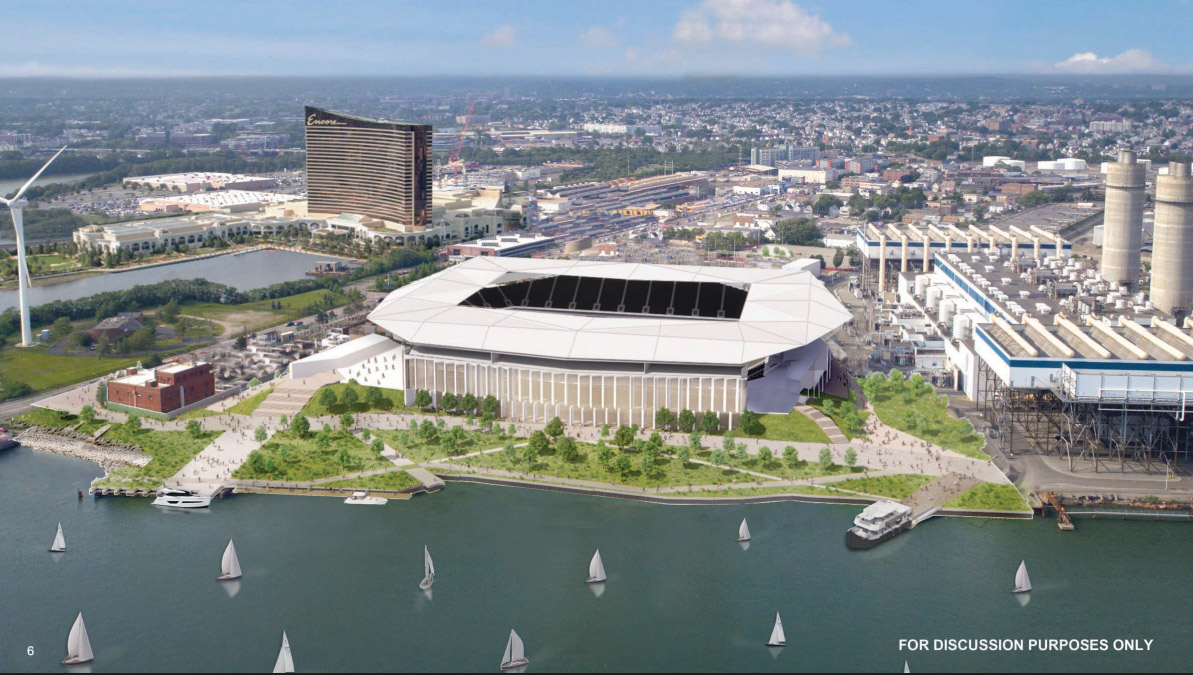
Kraft Group, Everett mayor slam Massachusetts Legislature for killing pro soccer stadium effort
The Kraft Group slammed the state Legislature’s failure to act on a major bill that would have cleared the way for it to clean up and redevelop a brownfield site into a new professional soccer stadium for the New England Revolution in Everett.
Language that would have freed up roughly 43 acres of land along the Mystic River to build an arena and park was included in an economic development bill that cleared the Senate, but not in the version approved by the House.
That left the project’s fate up to both chambers’ ability to reach a compromise, which lawmakers failed to achieve by the end of the formal legislative session on Thursday, thereby killing, for now, the bill and soccer stadium effort — an outcome the Kraft Group described in a statement as “deeply” disappointing.
“This legislative session, our Commonwealth missed a vital opportunity to clean up a brownfields site for an environmental justice community, robbing the city of Everett and its community of the ability to remove a dilapidated and decommissioned power plant,” the statement said, “and replace it with a public park, waterfront access and a privately-funded soccer stadium.”
The Kraft Group, which owns the Revolution and is headed by Robert Kraft, the billionaire owner of the New England Patriots, said it was “deeply disappointed that the House would not take up this legislation on its own, and that the Legislature was unable to act on major legislation at the end of this session.”
“This inaction on language that had no financial commitments from state or local government has halted the public process to determine the feasibility of this project before it could even begin,” the Kraft spokesperson said. “Passing this legislation was strictly about allowing us to start the process of determining the viability of this project for Everett.”
The project would have allowed the Revolution to move from its current home at Gillette Stadium in Foxboro.
The Kraft Group’s statement also appeared to take a shot at Boston Mayor Michelle Wu and her administration, which opposed and consistently criticized the project by saying, in part, that the addition of a professional soccer stadium could bring congestion and heavy foot traffic to areas of Boston directly across from the river.
“Massachusetts’ political landscape is one of the only places where creating opportunities in environmental justice communities and rehabilitation is dictated by the needs and bargaining of political leaders with outside influences and we had hoped for a different outcome for the citizens of Everett and environmental justice for that community,” a Kraft Group spokesperson said.
Mayor Wu’s office declined to comment on the latest legislative development.
Lurking behind the Everett stadium push was the backdrop of the 2025 Boston mayoral election. While Wu staunchly opposed the project, it was being pushed by a private group that includes Josh Kraft, a rumored mayoral candidate, among its leadership team.
Wu has announced her intention to seek reelection, while Josh Kraft is reportedly telling friends and allies that he will jump into the race this fall.
While Boston’s mayor remained mum on the stalled stadium effort, the Legislature’s failure to act on the closely-watched economic development bill was sharply criticized by the mayor of Everett, Carlo DeMaria.
The location the Kraft Group was eying features a rundown power plant that DeMaria has said can only be cleaned up with the financial and political power of a private development firm.
Language tucked into the bill that cleared the Senate would have removed the targeted land at 173 Alford St. from a designation that restricts its use to commercial fishing, shipping, or other vessel-related activities, and allow a developer to convert it into a professional soccer stadium and waterfront park.
Related Articles
Massachusetts July tax collections expected to be ‘very bad,’ top budget writer says
Boston City Council urges Gov. Healey to abandon plan to kick migrant families to the curb after 5 days
Major bills left hanging after Beacon Hill marathon session: ‘Ran against brick walls’
Families, migrants in overflow shelter will be urged to find ‘safe alternative housing,’ document says
Beacon Hill Democrats ignoring the calendar as they hold out hope for deals on major bills
DeMaria has argued that the project would be economically and environmentally beneficial for Everett, saying the city is expected to lose out on $55 million in tax revenue between fiscal year 2021 and 2026, “due to loss of value” from the parcel.
“This legislation isn’t about one project; it’s about the future of our city,” DeMaria said in a statement after the bill’s failure. “I am angry that the focus hasn’t been on the fact that Everett is an environmental justice community losing millions of dollars in tax revenue and instead is being forced to continue to tolerate a dirty industrial site when we could be starting the formal process to use private funds to clean up the area and start collecting important tax revenue.
“It’s incredibly unfair and inequitable that the dramatic needs of Everett are being overlooked,” he said. “I will continue to fight for the needs of Everett until we get the same redevelopment opportunities that all our surrounding communities have enjoyed and I will not stop until our residents get the same benefits they deserve.”


